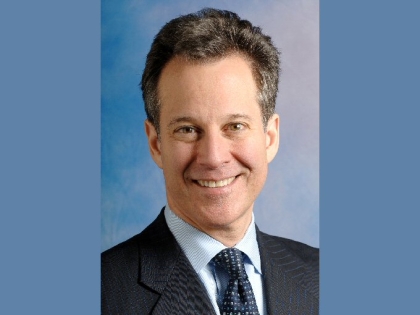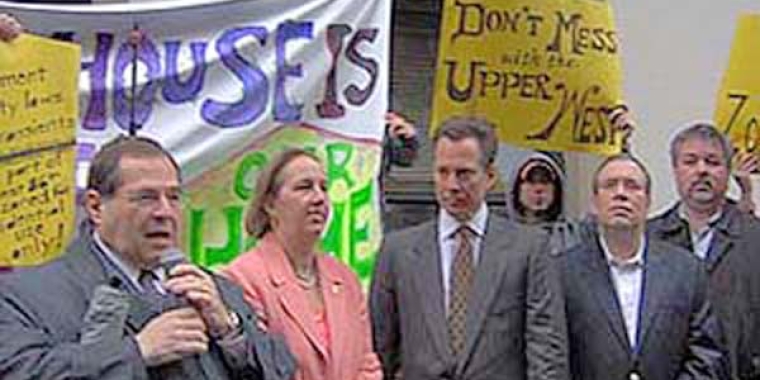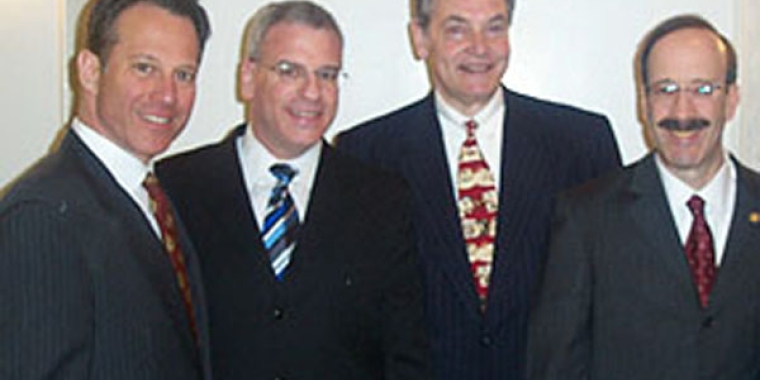
Senator Schneiderman, District Attorney Vance, Assembly Member Kellner Announce Major Reforms to Combat Public Corruption
Eric T. Schneiderman
May 4, 2010
-
ISSUE:
- Judiciary
SENATOR SCHNEIDERMAN, DISTRICT ATTORNEY VANCE, ASSEMBLY MEMBER KELLNER ANNOUNCE MAJOR REFORMS TO COMBAT PUBLIC CORRUPTION
Bill Increases Ability of District Attorneys to Prosecute Public Corruption Cases,
Legislative Fixes Close Loopholes, Strengthen Penal Law Crimes
ALBANY – On the eve of Reform Day in the Capitol, Manhattan District Attorney Cyrus R. Vance, Jr., State Senator Eric Schneiderman and Assembly Member Micah Kellner today announced the introduction of the Public Corruption Prevention and Enforcement Act, legislation to both prosecute and prevent public corruption in New York State. The wide-ranging legislation closes loopholes in current state law that prevent the prosecution of corrupt schemes, adds tougher rules for member items, implements stronger campaign finance and financial disclosure measures, and fixes a perceived loophole in the Election Law.
“New York has seen too many examples of public corruption in recent years,” said District Attorney Vance. “We have seen dishonesty at all levels of government, from lower-level public employees to the highest ranks of our government. This legislation will enable local prosecutors to regain their traditional role in rooting out and prosecuting public corruption, and bring honor back to public service.”
“Self-dealing politicians have betrayed the public trust. Given the regularity of scandals, investigations and convictions of elected officials in this state, it is no wonder that the public believes there is one set of rules for the powerful and another for everyone else,” said Senator Eric T. Schneiderman, the lead sponsor of the bill. “We must demand nothing less than the highest level of integrity from our elected leaders. This legislation is exactly the fix we need to combat the corrosiveness of corruption and cynicism so that government can function as a tool to improve people’s lives and strengthen our communities."
“This legislation will put a stop to the seemingly never-ending tide of graft and corruption scandals that flood out of Albany—scandals that reinforce New Yorkers’ perception that all lawmakers are crooks and clowns,” said Assembly Member Micah Kellner, the lead Assembly sponsor. “As long as lawmakers abandon their responsibility to enrich the lives of their constituents in favor of their own wallets, we deserve this reputation. This isn’t the Boss Tweed era, it’s 2010, and our laws should soundly punish those who abuse the public trust.”
The Public Corruption Prevention and Enforcement Act would take action in several areas. The bill:
- Enacts Duty of Faithful Public Service: Public servants hold a public trust and have a duty to act in a way that is faithful to the best interests of the state or municipality, and to their constituents. This bill creates a defined duty for public servants to do their jobs free of corrupt arrangements, in both the Penal Law and the Public Officers Law. The duty applies to public servants at all levels of government within the state, elected officials, employees and appointees.
- Punishes Corrupt Schemes to Defraud the Government: The bill expands the existing crime of defrauding the government by creating the crimes of scheme to defraud the government in the First and Second Degrees. Currently, the law is limited to schemes to defraud government agencies of property, services or resources. This bill would include corrupt schemes involving public servants and others who seek to corrupt the operation of government in any way. Violation is punishable as either a class D or E felony, depending on the nature of the offense.
- Reforms Criminal Bribery Statutes: The bill amends bribery statutes involving public servants in the Penal Law to ensure that bribery offers are punished as seriously as completed bribes. The bill amends bribery in the First, Second and Third Degrees to make public bribery statutes consistent with commercial bribery, sports bribery, and labor bribery statutes in the Penal Law.
- Reforms the Member Item Process: The bill creates new standards and prohibitions for community projects grants, which are commonly known as “member items.” Under the standards for the community project funds, grantees are barred from receiving grants if the grantee: was barred by a government agency in any jurisdiction within the last five years; failed to file a tax return or to pay taxes in the last five years; or used a third-party or agent to secure the grant. If the standards are violated, the attorney general may recover the grant through a lawsuit. In addition, the bill creates prohibitions for the sponsors of grants – members of the Legislature or the Governor – from requesting grants if the sponsor or a relative of the sponsor is a director, officer or trustee of the grantee. Sponsors and their relatives are also barred from having a financial interest in or receiving a benefit from a grant. The attorney general and any district attorney have concurrent authority to investigate and prosecute criminal violations of the law.
- Enhances Financial Disclosure for State Officials: The bill increases disclosure in both the Public Officers and the Election Law to prevent even the possibility of corrupt activities. The categories of value or amounts on the annual statements of financial disclosure filed in all three branches of state government would be disclosed to the public upon release, whereas current provisions in law and rules allow this information to be redacted. This change will allow the public to monitor the sources and values of outside income earned by our elected officials. A question is also added to the annual statement of financial disclosure requiring the reporting individual to disclose relationships with non-profit organizations.
- Strengthens Campaign Finance Rules: The legislation requires candidates for public office and their spouse or domestic partner to report gifts or loans for the 12 months preceding a candidate designation, to prevent loans intended for campaign use to be disguised as personal gifts. This fixes a perceived loophole that recently led to the acquittal after trial of a public official in Manhattan.
“There is no such thing as honest graft," said Senator Craig M. Johnson, (D-Nassau), who has helped sponsor this legislation. "Recent scandals have left the public disgusted with the political process and has distracted Albany from the important business at hand. This legislation will close the loopholes where public corruption has been allowed to fester and hold public officials up to the public's standards."
"The public has a right to expect higher standards from their elected officials," said Senator Liz Krueger. "This bill will make clear that use of one's office for personal benefit is more than a betrayal of the public trust -- it is also a crime."
"I am proud to support Senator Schneiderman on the quest toward more transparency and accountability from, not only our elected officials, but anyone working in public service," said Senator José M. Serrano. "As a strong advocate for reform, I am keenly aware of the urgent need for ongoing scrutiny and the implementation of rules that will encourage high standards of ethical behavior from the civil servants of New York State. This bill will help to prevent corruption and to inspire the public's confidence by ensuring that those who violate their trust are held accountable."
“It is unfortunate that this legislation is necessary, but New York State government needs to restore the public trust. Reform of the system is not just a desirable goal, it is absolutely necessary to root out and prevent corruption, to hold elected officials accountable to the public they serve, and to restore the public’s faith in state government,” said Senator David Valesky.
###
Share this Article or Press Release
Newsroom
Go to NewsroomDexter House Protest
April 1, 2009


Eric at a rally with members of CSEA
April 1, 2009

Eric at the March for Women's Lives in Washington DC
April 1, 2009
